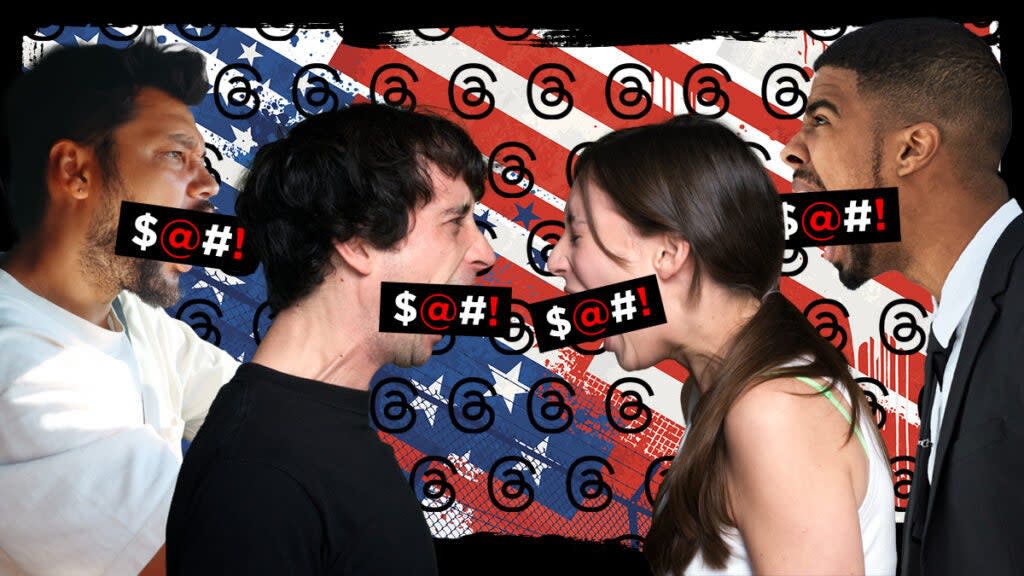Why Threads Isn’t the Social Media Haven Meta Promises | Analysis

After a rocket-ship trajectory to more than 100 million users, things aren’t looking quite as cheery for Threads, Meta’s text-centric alternative to what’s now called X.
Over half of Threads’ users have taken an extended break from it within its first month on the market. Civil rights groups have dinged Threads for not using Instagram’s fact-checking program, allowing misinformation and hate to freely proliferate. And advertisers, after initially clamoring to place commercial messages on Threads, may have fresh reason for caution.
Unlike X, Threads was supposed to be a “sanely run,” advertiser-friendly social network that wouldn’t feature the politically charged, incendiary town square aspects of its more established rival. As Threads grows, it’s not clear that it’s delivering.
“The question Threads will need to solve is where [X] has failed: How will Threads handle trust and safety?” said Liz Haglethorn, CEO of PostMarket, a content licensing company. “How safe will it feel? How will misinformation be managed? Not only are these questions important for users and user growth, but also for advertisers and their willingness to move ad dollars.”
As it stands, Meta’s not answering these questions, especially with regards to the management of misinformation. In one high-profile instance, Donald Trump Jr.’s Threads accounts was flagged as a source of misinformation, an incident that Meta spokesperson Andy Stone described as “an error.”
This was an error and shouldn’t have happened. It’s been fixed.
— Andy Stone (@andymstone) July 7, 2023
“Now that the initial fury of Threads has died down, we are starting to see some glaring issues,” said Lucy Walker, head of media at marketing agency MG Empower. “Rather than supplying its own dedicated policies, Threads has simply carried over Instagram’s community guidelines which simply isn’t enough.”
Walker criticized the inability to fully control Threads’ feed content, as well as citing Meta’s failure to extend a third-party fact-checking program used on Facebook and Instagram to Threads as an issue.
Meta’s been reeling back fact-checking efforts generally, including lifting its COVID-19 misinformation removal policy. The company also reportedly halted development on a fact-checking project that was being tested as recently as early 2023.
“With the historical experiences they’ve had with Facebook and Instagram, you’d expect them to take more responsibility,” Walker said. “Despite its issues, [X] at least has very clear moderation policies and guidelines that Threads seem to lack due to its decentralized approach.”
However, X isn’t doing great. Even with clear moderation policies, the former Twitter is still in the red with diminishing ad revenue. Some advertisers, despite new X CEO Linda Yaccarino’s efforts to court them to return, are saying they’re through with the service due to the same sort of content that’s spreading around Threads. It seems if Meta wants to avoid X’s fate, it can’t just match its rival. It’ll have to do better.
Media Matters, a left-leaning nonprofit organization and media watchdog, compiled a lengthy assortment of instances of fake news and misinformation circulating on Threads, free from moderation. Its report suggests that Threads’ mission to be “a less angry place” than X is not going as planned.
Meta’s not without its issues. Instagram, despite its safe-for-work positioning and stricter rules on nudity than X, was recently exposed as a home to a vast network of consumers and sellers of child sexual-abuse material. Though Instagram works to combat such activity, the reality is that Meta’s systems have never been perfect. Threads, built as an extension of Instagram, was never likely to radically improve on its roots.
Is less more?
Some experts, on the other hand, felt that Meta was going too far in the opposite direction with a heavy-handed, unproductive approach.
Bill Ottman, cofounder of blockchain-based social network Minds, said Threads could differentiate itself by offering users “maximum control” over the posts they see and avoiding what he characterized as “feed manipulation.”
Censorship only amplifies extremism, Ottman said, and favoring free speech, as X has done under Elon Musk, would be healthier for communities in the long term, he added. However, he acknowledged the tension Threads and X have in balancing user and advertiser interests, acknowledging that neither company appears to have a clear-cut solution.
Work in progress
It’s still early for Threads. Given that it’s still new and has had little time to define itself in the public sphere, enhanced content moderation could be in the pipeline along with other features.
“In the tech sector, it is almost always ‘shoot first, ask questions later’ and the launch of Threads shows that this is still the [standard operating procedure] at Meta,” said Joe Karasin, founder of Karasin PPC, a digital marketing firm. “There are many features that Threads lacks — direct messaging, hashtags, etc. — and this also applies to content moderation and other issues that have arisen since its launch.”
Meta reportedly rushed Threads to market to grab the social media spotlight as Elon Musk took X on a strange, advertiser-spooking trajectory. As a result, it debuted as a relatively skeletal app. Meta didn’t respond to TheWrap’s request for comment.
First impressions matter, though, and for the time being, the new social app is another X lookalike, down to the objectionable content. If businesses were hoping for a clean, well-lighted place for ads, they might have to keep looking.
The post Why Threads Isn’t the Social Media Haven Meta Promises | Analysis appeared first on TheWrap.


